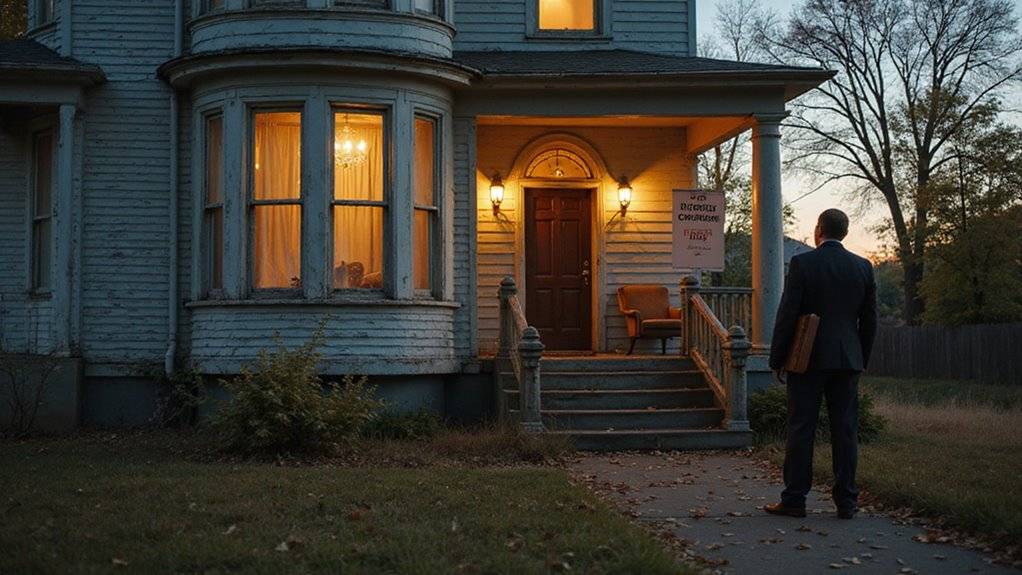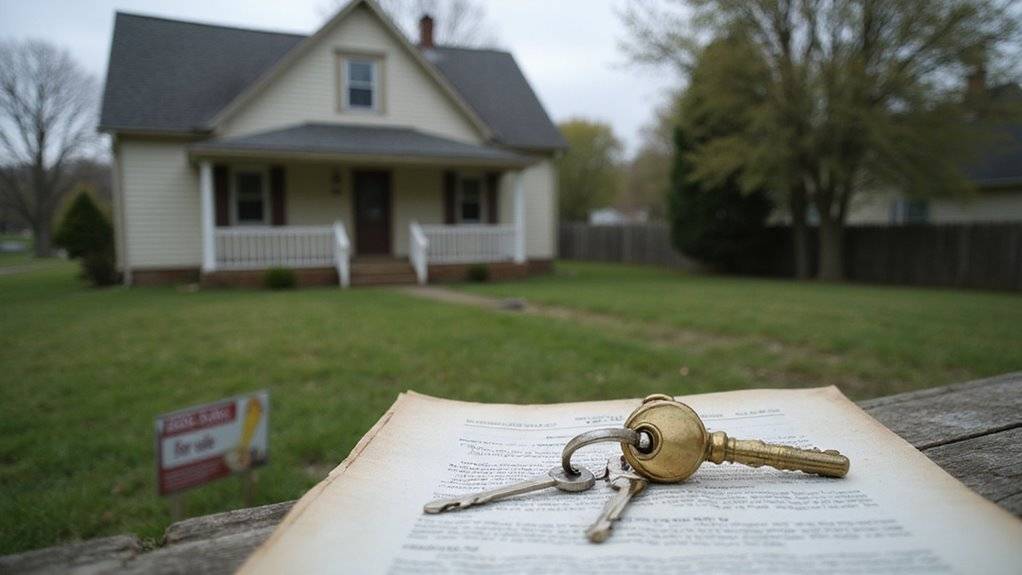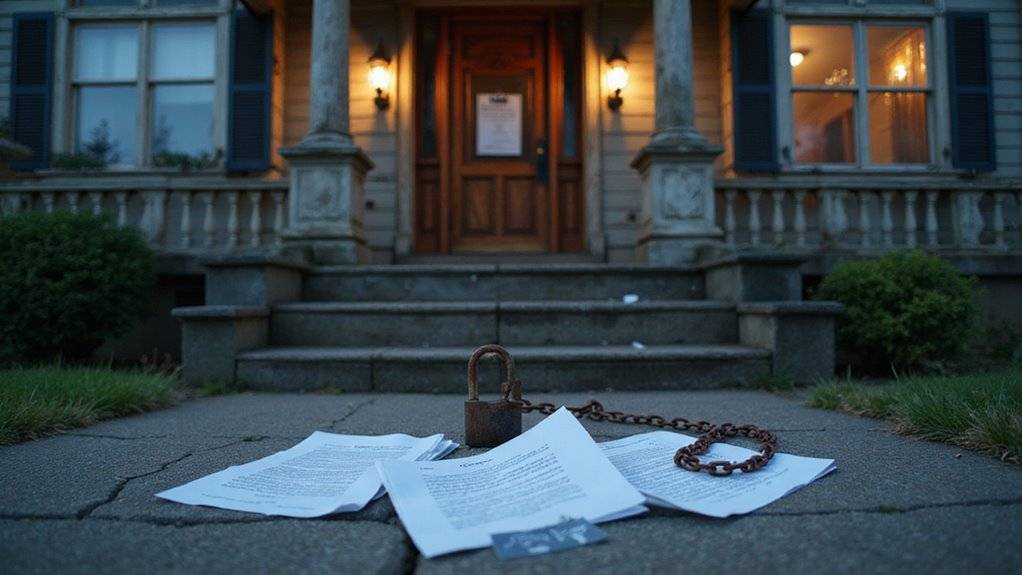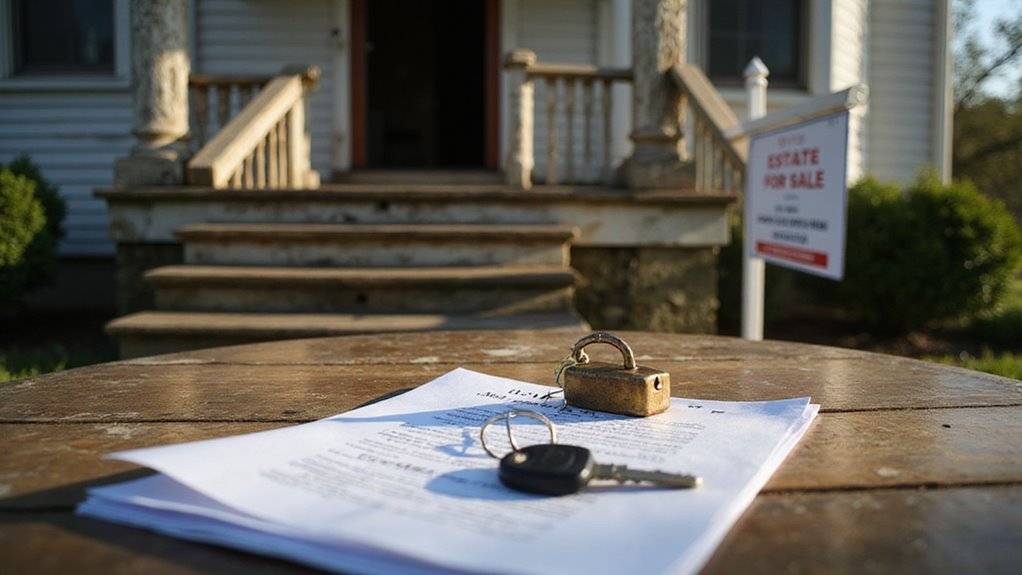Dealing with a deceased loved one’s property creates overwhelming stress during an already emotionally challenging time. Many executors and heirs face confusion about selling inherited property, especially without going through lengthy probate procedures. The process becomes more complex when considering legal requirements, documentation, and transfer restrictions. Fortunately, Missouri offers several options to streamline property sales after death.
In Missouri, selling a deceased person’s house without probate is possible through Transfer-on-Death Deeds, Living Trusts, or Joint Tenancy arrangements. Properties without these legal structures must go through probate before sale, though small estates under $40,000 may qualify for simplified procedures using Small Estate Affidavits.
This guide explores every aspect of selling a deceased person’s house without going through probate procedures.
Key Takeaways
Selling without probate is possible through Transfer-on-Death Deeds, Living Trusts, Joint Tenancy, or Small Estate Affidavits under $40,000.
Property ownership structure must be verified through deed review to determine if probate-avoidance mechanisms are in place.
Essential documents include death certificate, property deed, will or trust documentation, and tax records for legal compliance.
Selling without proper probate exposes sellers to title insurance complications and potential legal challenges from heirs or creditors.
Consulting a real estate attorney ensures compliance with Missouri law and protects all parties during the transaction process.
Can You Sell a Deceased Person’s House Without Probate?

No, you generally cannot sell a deceased person’s house without probate in most cases. Probate establishes legal authority to transfer property from the deceased to rightful heirs. Title companies require proper documentation to insure property sales after death. A sale without probate could face future challenges from potential heirs.
Legal alternatives exist to bypass probate. Transfer-on-Death Deeds, living trusts, and joint tenancy with survivorship rights allow property transfers without court involvement. Small Estate Affidavits work for estates valued under $40,000.
To protect all parties involved, complete probate or set up non-probate methods before death occurs.
What Is Probate and Why It Matters?
Probate is the legal process of validating a will and distributing assets after someone dies. The court supervises the transfer of property and settles any debts from the deceased’s estate. This protection ensures rightful heirs receive their inheritance. The process prevents disputes and maintains clear property records.
Several methods exist to avoid probate completely. Living trusts, Transfer-on-Death deeds, and joint tenancy agreements allow assets to pass directly to beneficiaries. Furthermore, estates under $40,000 can use simplified small estate affidavits.
The stakes remain significant for all parties involved. Proper documentation protects buyers and sellers from future legal challenges. Missouri law requires valid transfers through probate or approved alternatives.
Do You Need Probate to Sell an Inherited House?

Yes, probate is usually required to sell an inherited house, unless specific arrangements were made beforehand.
The law requires probate proceedings to establish clear property ownership and transfer rights after someone’s death. A few legal exceptions exist that can bypass probate requirements. These include Transfer-on-Death Deeds, living trusts, and joint tenancy with right of survivorship.
Moreover, title companies need proper probate documentation to issue insurance. Without completed probate, any property sale could face legal challenges under estate laws. Proper planning helps protect both sellers and buyers during inherited property transactions.
What Are the Legal Alternatives to Probate?
If you’re looking to avoid the probate process in Missouri, you have several legal options that can transfer property ownership without court involvement. These alternatives include Small Estate Affidavits for estates under $40,000, Transfer-on-Death (TOD) Deeds that must be recorded before death, Living Trusts where a trustee manages the property, and Joint Tenancy with Right of Survivorship that automatically transfers ownership to the surviving owner. Each method has specific requirements under Missouri law, so you’ll need to determine which option applies to your situation.
Small Estate Affidavits
Small Estate Affidavits help transfer property when estates meet specific value limits. Missouri law allows small estate affidavits for estates under $40,000 through RSMo 473.097. The process bypasses full probate court proceedings.
A 30-day waiting period applies after death before filing the affidavit with probate court. This document must list all assets, heirs, and outstanding debts.
Many title insurance companies prefer traditional probate for real estate transfers. Smart property sellers should contact title insurers first. This step ensures protection for future property transactions.
Transfer-on-Death Deeds
A transfer-on-death deed lets property owners name beneficiaries to receive real estate after death. The property transfers automatically to designated heirs without going through probate court. This legal document remains revocable during the owner’s lifetime.
The process offers significant advantages for estate planning. Families save time and money by avoiding lengthy court proceedings. Title companies accept these deeds because the transfers are legally established beforehand.
Moreover, beneficiaries gain immediate access to the property upon the owner’s death. The seamless transfer protects privacy and prevents property disputes between family members.
Living Trusts
Living trusts offer distinct advantages over traditional probate for transferring assets after death. Property transfers through living trusts remain private and avoid court involvement, while probate becomes public record. A living trust allows you to maintain control of assets during your lifetime.
The probate process typically takes 6 to 12 months, whereas trust transfers happen quickly. Your successor trustee can take immediate action after death to manage assets. This smooth transition helps beneficiaries access their inheritance faster.
Beyond these benefits, a living trust reduces stress for your loved ones during a difficult time. Your family can avoid court appearances and lengthy legal procedures.
Joint Tenancy with Right of Survivorship
A joint tenancy with right of survivorship transfers property ownership automatically when one owner dies.
Two or more people own equal shares of the property during their lifetimes. The surviving owner receives full ownership rights immediately after another owner’s death. This legal structure bypasses the probate process completely.
The survivor must file a death certificate with the county recorder to update property records. After recording, the survivor gains complete control over the property. No court approval becomes necessary for future property sales. As a result, families save time and money on legal proceedings.
How to Sell a House Without Going Through Probate?

If you’re looking to sell a deceased person’s house without probate, you’ll need to follow specific legal steps to protect yourself from future claims and title issues. Start by determining how the property was owned—whether through joint tenancy, a trust, or a TOD deed—since these structures can bypass probate entirely. You’ll also need to gather documentation, consult a real estate attorney, secure any necessary court permissions, and complete required tax filings before closing the sale.
Determine Property Ownership Structure
Review property deeds at the county recorder’s office to confirm ownership details. Property can be owned through sole ownership, joint tenancy, or transfer-on-death designation. A deed search reveals specific ownership terms that affect probate requirements.
Furthermore, sole ownership typically requires full probate proceedings in court. Joint ownership or transfer-on-death arrangements may bypass probate entirely. The ownership structure determines which legal steps follow.
Most importantly, proper ownership verification protects all parties from future title disputes. A title company can assist with thorough ownership research if needed.
Gather Necessary Documentation
Essential documents needed for property transfers after death: A minimum of five certified death certificates must be obtained from vital records to handle estate matters. The property deed proves current ownership status and transfer rights. State probate laws determine which papers establish legal authority to sell inherited property.
Legal papers should include the original will, recent tax statements, and mortgage documents. Transfer-on-death deeds can simplify the process by avoiding full probate requirements. A systematic file organization helps streamline work with title companies and estate attorneys.
Consult with a Real Estate Attorney
A real estate attorney protects your interests and ensures legal compliance when selling property without a will.
Missouri law RSMo 473.263 requires specific documentation and procedures for property transfers without probate. Legal experts navigate these requirements effectively. A qualified attorney reviews title insurance needs and verifies proper clearance steps.
Your lawyer prepares authorization documents needed for closing. This protection safeguards against future claims from unknown heirs or creditors. Legal counsel must verify that all state-mandated waiting periods have passed before proceeding with the sale.
Professional guidance reduces risks and speeds up the selling process. The attorney’s expertise prevents costly mistakes and delays.
Obtain Required Court Permissions
Courts must approve real estate transfers in probate cases. A formal petition to the probate court remains necessary for property sales over $40,000 in value. The personal representative submits this request with supporting documents.
Required paperwork includes current property appraisals and detailed sale plans. Courts verify that all legal heirs receive proper notification before granting approval. After review, courts issue official sale authorization orders.
The final court order protects both buyers and sellers by establishing clear transfer authority. This legal protection ensures smooth property transactions and valid ownership changes.
Complete Required Tax Filings
Tax filings must be completed promptly after someone’s death to meet legal requirements and avoid penalties.
The estate needs its own tax ID number from the IRS through Form SS-4. A final Form 1040 must be filed for the deceased person’s last year of life. Form 1041 reports any income earned by the estate during the administration period.
Moreover, the executor should request tax clearance certificates from state and federal authorities. These documents prove all tax obligations have been met. This protection allows for safe distribution of remaining assets.
What Are the Risks of Selling Without Probate?

Selling a deceased person’s house without probate exposes you to serious legal and financial risks that can derail the transaction or create liability down the road. You’ll likely face title insurance complications, potential lawsuits from heirs or creditors, and challenges securing clear ownership for the buyer. Understanding these risks—including title defects, legal challenges under RSMo 473.263, future estate claims, and unresolved tax obligations—helps you make informed decisions about whether shortcuts are worth the repercussions.
Title Insurance Complications
Title insurance companies often reject coverage for properties sold without proper probate documentation. A sale without probate can trigger legal challenges from potential heirs and void the transaction entirely. Buyers face major risks when title insurance isn’t available.
Clear ownership through probate safeguards everyone involved in the property transfer. Most mortgage lenders require title insurance before approving loans for property purchases. Moreover, skipping probate can expose sellers to future lawsuits and financial losses.
Therefore, securing proper probate documentation remains essential for a successful property sale. Laws in all 50 states mandate clear property ownership verification before title insurance approval.
Potential Legal Challenges
Several legal risks exist when selling inherited property before probate completion.
Creditors maintain the right to contest property sales if the estate has outstanding debts. Courts can invalidate unauthorized sales, which creates liability for both buyers and sellers. The financial impact affects all parties through potential lawsuits and contract disputes.
To minimize these challenges, proper legal authority must be established first. A clear probate process protects everyone’s interests and ensures a valid transaction. Moreover, working with qualified professionals helps prevent costly legal complications.
Future Claims Against the Estate
Future claims can emerge even after an estate is settled. Claims often arise from creditors pursuing unpaid debts, tax authorities seeking overdue payments, or previously unknown heirs contesting the distribution. Property liens and disputes about asset sales represent common challenges.
Legal fees and settlement costs may strain the estate’s resources. A thorough estate administration process helps prevent most future claims. Executors should maintain detailed records and follow proper procedures to protect against potential issues.
Tax Implications
Tax consequences matter significantly when selling inherited property without probate. The IRS requires estate tax filings before any property transfers can occur legally. Both federal and state tax obligations must be met, regardless of the estate’s value.
Missouri law mandates proper documentation of real estate inheritance taxes through the probate process. Bypassing probate creates risks for unfiled returns and missed tax obligations. Legal clearance becomes impossible without formal probate procedures.
Potential outcomes include tax penalties, property liens, and future liability issues. The total estate value may trigger federal estate taxes above certain thresholds. These issues affect both probate and non-probate assets equally.
How Does Selling to Cash Buyers Simplify the Process?
Cash buyers can accelerate your sale by eliminating financing delays and appraisal contingencies that typically extend closings by 30-45 days. You’ll avoid costly repairs since most cash buyers purchase properties as-is, regardless of condition. The streamlined process requires fewer documents and faster title work, though you still need proper legal authority through probate, a TOD deed, or another valid transfer method under Missouri law.
Faster Closing Timeline
Cash buyers can close in 7-14 days versus 30-60 days with traditional sales. Fast closings create immediate financial benefits for estate sellers. The quick process reduces stress and ongoing costs.
Property expenses drop significantly without monthly utilities, insurance, and maintenance fees. Heirs receive their inheritance portions faster through expedited settlements. Tax obligations resolve more efficiently with a shorter timeline.
Legal requirements still apply during quick sales. The estate must complete proper documentation and title clearance before closing. A rapid transaction streamlines the entire probate process once authority transfers.
No Financing Contingencies
Cash buyers make firm offers without mortgage contingencies, eliminating financing-related deal failures. A traditional mortgage-dependent offer can fall through if the bank denies the loan. Cash purchases move forward without these delays or risks.
Missouri law still requires proper legal authority through probate or valid transfer documents. The seller must verify their right to sell and satisfy any estate obligations. All creditor claims and heir interests need protection under state regulations.
Cash transactions provide speed and certainty in estate sales. Estate representatives can close quickly while maintaining legal compliance. This approach best serves beneficiaries who need prompt resolution.
As-Is Purchase Options
Property owners can sell homes without making any repairs or updates. Traditional financing requires inspections and repairs that often cost $5,000-15,000. Cash buyers purchase properties in their current condition.
The process becomes simpler through as-is sales. Sellers avoid spending money on renovations or maintenance. Cash buyers typically close within 7-14 days instead of 30-45 days with traditional financing.
Furthermore, sellers save on ongoing expenses. Monthly carrying costs like utilities, taxes, and insurance average $500-1,000 for vacant properties. The legal requirements remain unchanged. Missouri law mandates proper documentation and title transfer regardless of sale type.
Reduced Documentation Requirements
Cash buyers face minimal paperwork requirements compared to traditional mortgage sales. Basic legal documents include only the deed, settlement statement, and title search. No appraisals, bank statements, or income verification forms are needed.
As a next step, Missouri law requires proper probate documentation or Transfer-on-Death deeds before any property transfer. This legal protection ensures all heirs and creditors maintain their rights. Despite the simplified process, buyers must still follow state regulations.
Furthermore, quit claim deeds after death are not valid without proper legal authority in Missouri. The streamlined documentation saves both time and money while maintaining legal compliance.
Conclusion
Selling an inherited house without probate can create significant challenges for many families in Missouri. The legal process often leaves properties vacant while heirs struggle with paperwork and court proceedings. These vacant properties continue to accumulate costs through taxes, maintenance, and potential depreciation.
At Freedom Path Investors, we understand the complexities of selling inherited properties across Missouri cities. We specialize in purchasing probate properties directly from heirs, even before the probate process completes. Our team handles all the necessary legal work while providing fair cash offers for inherited homes in any condition.
We have helped numerous families in Kansas City, St. Louis, Springfield, and other Missouri communities resolve their inheritance situations. Our straightforward buying process eliminates the need for repairs, real estate agents, or lengthy waiting periods. If you have inherited a property and need assistance, we can provide a no-obligation cash offer within 24 hours.








